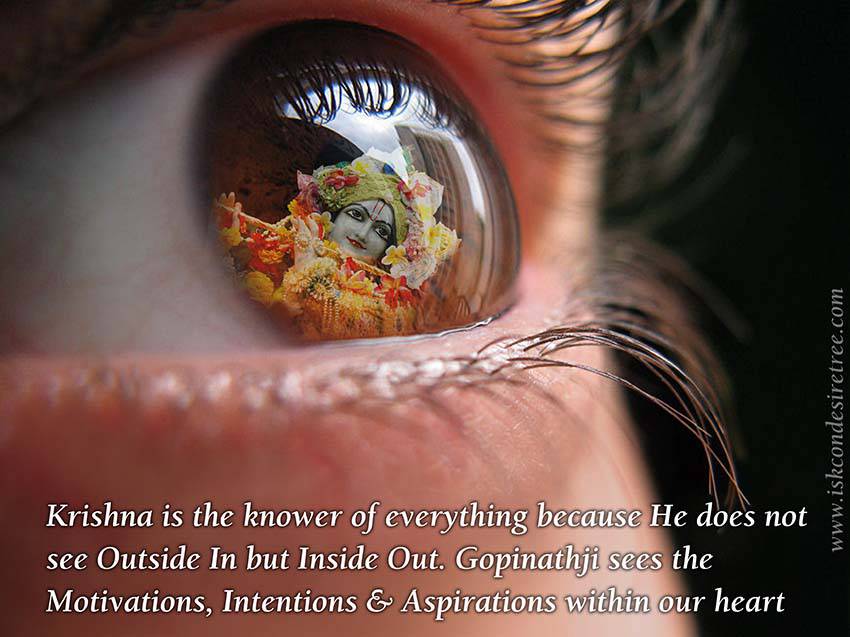Hare Krishna
12th Oct, 2015. Gurgaon

I read so much, and hear even more so, on being humble and not just simply humble but humbler than a blade of grass. It feels nice as I read such terms and collect more ‘information’ on how to get into the ‘mood’ of being humble but whenever I am put into a test I fail miserably, a deadly mixture of hardheartedness, passion and ignorance takes over my consciousness. I simply remain a puppet in the hands of three modes of nature.
Many a times I wonder, and now a days also pray to Lord, as to what are You trying to teach me by putting me in such circumstances? Doesn’t the Lord already knows that I have very weak spiritual muscles, doesn’t He know that I will fail such tests, they why? Is it to make me more humble and tolerant or is it tell me that I am just a show bottle devotee with no real substance inside me or to let me realise that I do not have any love for Krishna as compassion for others is directly linked to our love of Krishna or all of the above!
It is indeed a very grim and helpless condition for me. My heart cries out to Krishna. I wish my heart could speak directly and cry and cry, cry out so loud that it’s steel like frame would burst open. Unfortunately that too doesn’t happen.
But one positive outcome happened this time. With such failures I am learning how each difficult situation forces me to remember Krishna more and more! It makes me realise my helpless condition in this world, gives me some emotions to chant better. In fact writing this blog I suddenly remember the famous prayer of Kunti Maharani. I can now appreciate, a little bit, the below verse spoken by Kunti Maharani to Krishna
vipadaḥ santu tāḥ śaśvat tatra tatra jagad-guro
bhavato darśanaṁ yat syād apunar bhava-darśanam (SB 1.8.25)
Translation
I wish that all those calamities would happen again and again so that we could see You again and again, for seeing You means that we will no longer see repeated births and deaths.
As I write these heavy words I introspect within my heart if I have the courage to even repeat these words, forget about asking for it! But strangely today I find some courage in my timid heart as I pray to Lord to please put me through the same circumstances again and again and again, let people insult me, beat me, abuse me, let me fail again and again and again, if this alone would help me remember Krishna at all times then let it happen again and again.
I pray to my dear Lord to be merciful upon this wretched soul and take away everything from me, all my so-called possessions, my wealth, my position, my family. Let this world reject me, treat me as a worm in the stool, let the last iota of any sense of ego or to remain independent gets rubbed finely to the ground, but I beg my Gurudeva and Srila Prabhupada to somehow make me remember Krishna at all time. Let my mind and my heart be engaged only in His thoughts alone and let my own life’s drama take a back seat now, I have had enough of it.
I searched for a prayer and, not surprisingly, I found one in Saranagati, by Srila Bhaktvinoda Thakura, called Amar Jivana:
āmāra jīvana, sadā pāpe rata, nāhiko punyera leṣa
parere udvega, diyāchi je koto, diyāchi jīvere kleśa
nija sukha lāgi’, pāpe nāhi ḍori, doyā-hīna swārtha-paro
para-sukhe duḥkhī, sadā mithya-bhāṣī, para-duḥkha sukha-karo
aśeṣa kāmanā, hṛdi mājhe mora, krodhī, dambha-parāyana
mada-matta sadā, viṣaye mohita, hiḿsā-garva vibhūṣana
nidrālasya hata, sukārye virata, akārye udyogī āmi
pratiṣṭha lāgiyā, śāṭhya-ācaraṇa, lobha-hata sadā kāmī
e heno durjana, saj-jana-varjita, aparādhi nirantara
śubha-kārya-śūnya, sadānartha-manāḥ, nānā duḥkhe jara jara
bārdhakye ekhona, upāya-vihīna, tā’te dīna akiñcana
bhakativinoda, prabhura caraṇe, kore duḥkha nivedana
Translation:
1) I am an impious sinner and have caused others great anxiety and trouble.
2) I have never hesitated to perform sinful act for my own enjoyment. Devoid of all compassion, concerned only with my own selfish interests, I am remorseful seeing others happy. I am a perpetual liar, and the misery of others is a source of great pleasure for me.
3) The material desires within the core of my heart are unlimited. I am wrathful, devoted to false pride and arrogance, intoxicated by vanity, and bewildered by worldly affairs. Envy and egotism are the ornaments I wear.
4) Ruined by laziness and sleep, I resist all pious deeds; yet I am very active and enthusiastic to perform wicked acts. For worldly fame and reputation I engage in the practice of deceitfulness. Thus I am destroyed by my own greed and am always lustful.
5) A vile, wicked man such as this, rejected by godly people, is a constant offender. I am such a person, devoid of all good works, forever inclined toward evil, worn out and wasted by various miseries.
6) Now in old age, deprived of all means of success, humbled and poor, Bhaktivinoda submits his tale of grief at the feet of the Supreme Lord.
In the end, I pray, may Lord Nityananda be merciful upon me and allow me to visit and roll in the dust of Sri Mayapur Dhama, this seems the only solution to the dreaded disease which has overcome my heart.
All glories to Sri Guru and Gauranga.
All glories to Srila Prabhupada.

